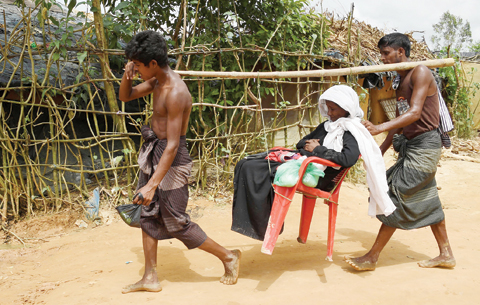'Incredible outpouring of local generosity'
 KUTUPALONG: Rohingya refugees carry an elderly woman at the Kutupalong refugee camp yesterday. — AFP
KUTUPALONG: Rohingya refugees carry an elderly woman at the Kutupalong refugee camp yesterday. — AFPCOX'S BAZAR: Bangladesh needs "massive international assistance" to feed and shelter the 436,000 Rohingya who have fled Myanmar in recent weeks, the head of the UN refugee agency said yesterday. UN High Commissioner for Refugees Filippo Grandi said there were "immense" challenges after visiting the overflowing camps around Cox's Bazar in southern Bangladesh. "I was struck by the incredible magnitude of their needs. They need everything -- they need food, they need clean water, they need shelter, they need proper health care," he told reporters.
Grandi said there had been an "incredible outpouring of local generosity" but that now needed to be "beefed up by massive international assistance, financial and material". "That's partly why I am here, to help... the government organize that response," he said. The UN said yesterday that 436,000 Rohingya, a stateless Muslim minority, had arrived from Myanmar's Rakhine state since an outbreak of violence there a month ago.
Grandi said the influx had slowed in recent days but it was impossible to tell whether more would come. He also said his office was providing "technical assistance" to help Bangladesh register the Rohingya, whom Myanmar considers to be illegal immigrants. Bangladesh only recognizes a tiny fraction of around 700,000 Rohingya living in camps near the border with Myanmar as refugees, referring to the rest as undocumented Myanmar nationals.
It has "no plan for the time being" to grant refugee status to the newly-arrived Rohingya, senior Bangladesh minister Amir Hossain Amu said yesterday. "We want Rohingya to return to their own land," said Amu, who chairs a cabinet committee on national security. Bangladesh has begun providing the new arrivals with identity cards and recording their biometric data, a process that began last week and is expected to take several months to complete.
Many hope that will allow them eventually to return to Myanmar. Civilian leader Aung San Suu Kyi said last week that those who had been verified as refugees from her country would be allowed back. Grandi said he hoped the UN's role would give the registration "the necessary credibility, which is so urgent not just for repatriation but for assistance". At the moment, UN agencies say it is difficult to ensure aid is distributed evenly because refugees are undocumented and are still moving from one place to another. Grandi said the scale of the influx -- which he called the "fastest and most urgent refugee emergency in the world" -- had made it difficult to assess needs quickly. But he added: "I think that the response is getting more organized." UNICEF said yesterday that a plane carrying 100 tons of emergency aid from Europe, including water purifying tablets, sanitary items and plastic tarpaulins, had reached Bangladesh.
Telecommunications banned
Bangladesh has banned telecommunication companies from selling mobile phone connections to Rohingya refugees, citing security concerns for the latest restrictions, officials said yesterday. Bangladesh's four mobile phone providers were threatened with fines if they provide any of the nearly 430,000 newly arrived refugees from Myanmar with phone plans while the ban is in force.
"For the time being, they (Rohingya) can't buy any SIM cards," Enayet Hossain, a senior officer at the telecoms ministry, told AFP yesterday. The decision Saturday to impose a communication blackout on the stateless Muslim minority was justified for security reasons, said junior telecoms minister Tarana Halim. Bangladesh already prohibits the sale of SIM cards to its own citizens who cannot provide an official identity card, in a bid to frustrate the organisational capacity of homegrown militants.
"We took the step (of welcoming the Rohingya) on humanitarian grounds but at the same time our own security should not be compromised," Halim said, without elaborating on what specific risk the Rohingya posed. Bangladesh's telecoms authority said the ban could be lifted once biometric identity cards are issued to the newly arrived refugees, a process the army says could take six months. It is just the latest restriction imposed on the Rohingya who have fled in huge numbers from violence in neighboring Rakhine State into squalid camps in Bangladesh's southernmost Cox's Bazar district in the past four weeks.
The nearly 430,000 refugees have been herded by the military into a handful of overstretched camps near the border, where tens of thousands live in the open without shelter. Many have been evicted from squatting in forest and farmlands by police and soldiers, who have been ordered to keep the Rohingya from seeking shelter in major cities and nearby towns. Roadblocks have been erected along major routes from the camp zones, where a dire shortage of food, water, shelter and toilets is creating what aid groups describe as a humanitarian crisis.
Some 5,100 have already been stopped at these checkpoints and returned to the designated camps, police said. "We have set up 11 check posts across the Cox's Bazar highway to stop the Rohingya refugees from spreading further toward the interior," Cox's Bazar police chief Iqbal Hossain told reporters. - AFP










